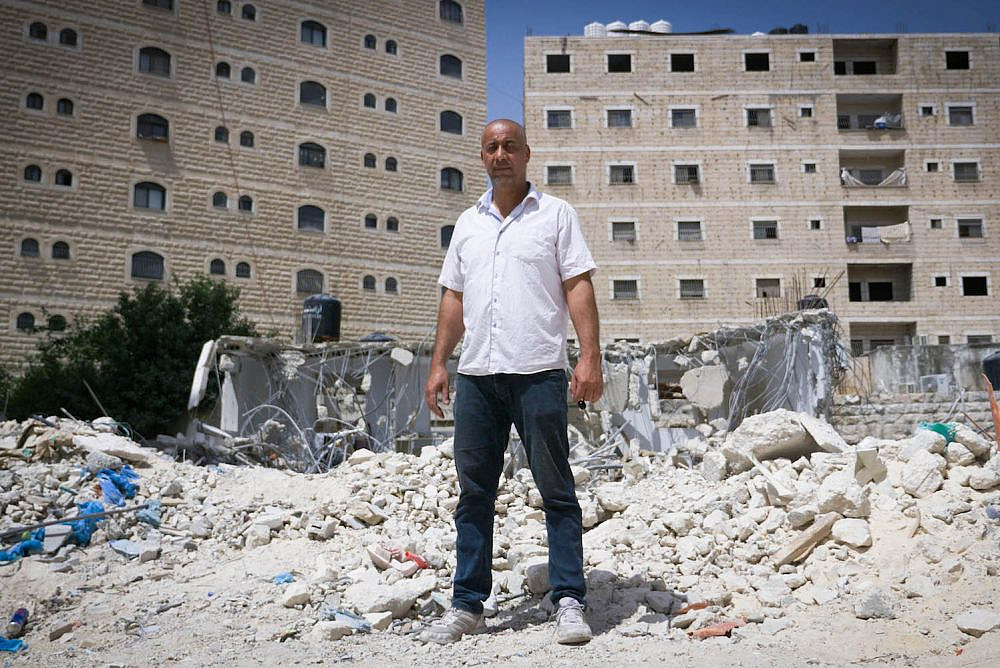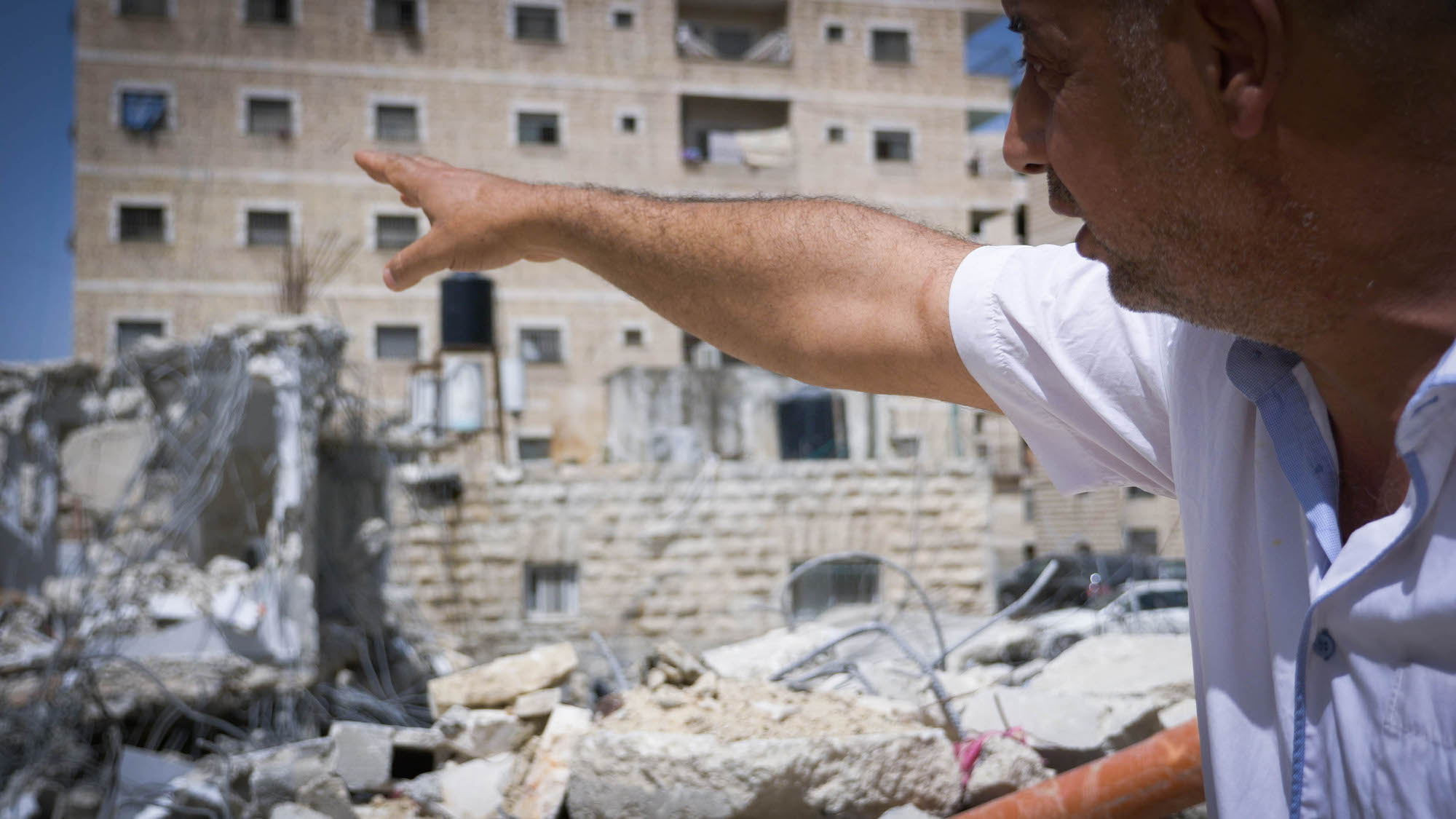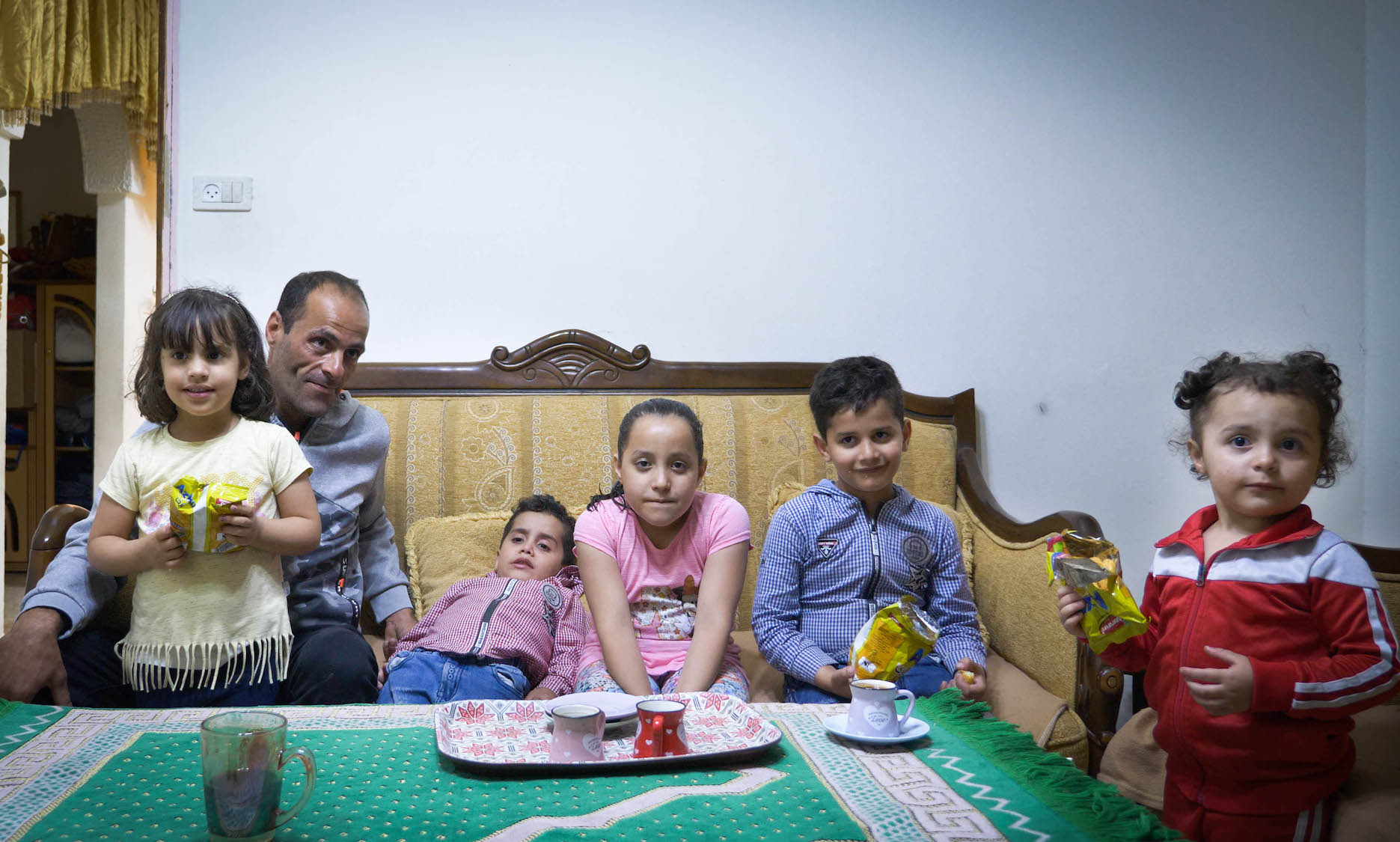‘They tossed us out like garbage’: The Palestinians who lost their Jerusalem homes
Israel demolished a record number of Palestinian homes in East Jerusalem in 2020. Behind every destroyed home is a family that has lost everything, including the ability to rebuild their lives.
 |
Here’s a dry statistic: according to numbers provided by human rights group Ir Amim, a record high 140 Palestinian families in East Jerusalem lost their homes in 2020. In 2019, 72 Palestinian families from Jerusalem saw their homes demolished, while in 2018 the number was 59. Most of these people, who watched as bulldozers rammed through the walls of their homes, are invisible in the eyes of the Israeli public. They become a statistic. But every demolished home brings with it a total upheaval for the family with repercussions that last years — far beyond the demolition itself.
I met three separate Palestinian families a moment after their homes were demolished in 2020. I spoke to them again at the end of last year to hear what has happened in their lives since their houses were destroyed. They are not criminals — they are people who built their homes on privately-owned land that, to their misfortune, was located in an area where Israel seeks to decrease Palestinian presence due to demographic considerations. And when Israel wants to remove Arabs from their land, it will find ways to do so.
The Abadiya family
Ismayil Abadiya was born and raised in the East Jerusalem neighborhood of Sur Baher. When he wanted to build a home for his children on his own land, he discovered that it was impossible for him to receive a building permit from the Israeli authorities. Sur Baher’s master plan, it turned out, was drafted by the Jerusalem Municipality and various planning bodies, but did not designate his land for construction.
This is how master plans look in East Jerusalem: the majority of them have not been updated for 20 years, and it is very difficult to receive a building permit precisely because they were drawn up in order to limit the expansion of the neighborhoods.
Ismayil didn’t want to take a chance and build without a permit, as many in his situation do, and decided to buy land in Wadi al-Hummus, only a 10-minute drive from his home. Wadi al-Hummus is located outside Jerusalem’s municipal boundaries as they were defined by Israel in 1967, when it occupied the eastern part of the city. He built a house there legally and received all the necessary permits from the Palestinian Authority, which is responsible for building permits in Area B of the West Bank, where the land is located.
After the house was built, Ismayil found out about the existence of a military order prohibiting construction near the separation fence, which Israel had erected just a few dozen meters away. Ismayil’s attempt to take his struggle to the courts didn’t help. I was with him on the night his home was demolished in 2019. “The soldiers came in and I immediately put my hands up. Two of my children were inside and I didn’t want any violence,” he said.
WATCH: Israeli forces demolish the Abadiya family home
“At first, when they knocked on the door, we refused to leave because this is our home. But from the moment they broke it, I wanted to take everyone and get out. But they came in throwing punches and tossed us out like garbage.”
I remember him sitting on the road, his eyes puffy, next to his eldest son who was coughing from the tear gas that had been shot at them just a few minutes earlier. “I’m sorry, I’m sorry,” Ismayil murmured while looking at his son. I remember the bicycle that belonged to Hiba, his four-year-old daughter, mangled and buried beneath the rubble.
We stayed in touch for a few months. I felt responsible because I wrote about and photographed him for an article. I reached out to all kinds of charities, aid organizations, and lawyers for help. Some promised financial or legal help, but did not do much. There was really nothing anyone could do.
A month after the destruction, when I came to visit him, Ismayil hosted me at his mother’s house where he and his five children were living. We went together to the site of his old home, where Ismayil goes every day just to look. The family’s belongings were still buried there under a pile of rocks.
Over time we began to speak less. I did not want to give up; I thought that perhaps telling more people about what happened would help.
I suggested starting a crowdfunding campaign, but Ismayil flatly refused. At first he said that because the municipality does not issue building permits and since there is nowhere for him to build legally, it did not matter. Another time he told me, “It’s something physical in my body. I can’t ask for money from strangers.” Slowly I stopped hearing from him. At a certain point I stopped calling as well.
Last July, exactly a year after his home was demolished, Ismayil called. “I’m in the car,” he told me. “I have traveled far. I cannot breathe anymore. I have nothing to lose anymore.”
He said his daughter celebrated her fifth birthday the week prior. “Her friends, little children, came to visit. They laughed at us that we were like that, miserable. Living in a room in my mother’s house. They stood next to me and she shouted at them, ‘Do not approach my father, he is mine. He is only mine. I love him.’”
“She is more afraid for me than I am for her,” Ismayil said. “At night she clings to me. During the day she sits next to me and is silent. All my life I have tried to take care of her, to be a good father, and in the end she is the one taking care of me.”
I once again offered to launch a fundraising campaign. He refused. “If I do, what’s the difference between me and a beggar?”
“I want you to put me in touch with Ofer Hindi, the officer who signed the demolition order,” he told me. “I want him to know me, to know who I am. I will ask him to build a smaller house on my land with a high fence, so that there will be no security issues due to the proximity to the wall. whatever he wants, just put us in touch.”
The Ali family
Last June, Israeli authorities demolished the home of Ihab Hassan Ali in Shuafat Refugee Camp. This was the third time he had been expelled. “Before 1948, we lived near Abu Ghosh [an Arab village near Jerusalem], in a village called Beit Thul. My parents were deported from there during the Nakba, the house was demolished, and since then we have been a family of refugees,” he said. “At the time, my parents moved to the Old City [of Jerusalem]. But in 1967, in the weeks after the occupation, they were also removed from there. That is why we came to Shuafat camp.”
In recent years, many Palestinians in Jerusalem have been forced into the camp, which sits beyond the separation wall, after Israel denied them building permits inside the city or demolished their home, just like in the case of Ihab.
Jerusalem’s municipality provides almost no services to the appallingly crowded Shuafat Refugee Camp. Construction is carried out without supervision or permits in a dangerous manner. Ihab built a home there more than 30 years ago, when the camp was sparsely populated. He lives there with his children and grandchildren.
In the 1980s, when Ihab built his home, he tried to obtain a building permit, but received the following single-sentence response from the Jerusalem Municipality Organization and Monitoring Unit: “No approved plan and no building permit can be obtained for the area in question.” Ihab said that, like many Palestinians in the city, he had only two options: leave Jerusalem, or build his home without a permit.

More than 30 years later, large police forces arrived and demolished his house. It was a large, two-story building next to the family supermarket. A representative from the municipality told Ihab that the demolition was taking place now because the house was too close to the separation fence.
“I built this home for my family long before the barrier was built,” he said. “The construction workers who built the barrier would rest in my garden, I would serve them tea. If the barrier is close to my home it is because Israel built it close to my home.”
When I called him at the end of last year, he told me: “Neither I nor my family family have mentally recovered. We are trying to figure out what to do financially. When I was young, I worked as a construction worker but stopped in my forties. I took all my savings and opened a small supermarket. Now I’ve gone back to working as a laborer without a shekel to my name, but my body is not as it used to be and my legs burn at the end of every day.”
“I do not show my children and grandchildren how difficult this is,” Ihab continued. “I tell them not to worry, that this is how it is, that in the future we will buy another piece of land, live like other people do, build a house with the same floors and windows we once had. I try not to let them walk by the destruction, which is still there inside the camp. I use other streets, but it is difficult because their school is close to there.”
“On paper I am a citizen, but I have no rights. The [authorities] come to the camp every day. They only hand out fines and demolition orders so as to make us leave the city. This process that has only increased in the last 20 years. Before Oslo it wasn’t like this. It all started changing in 1994. They clamped down on enforcement against Palestinian construction in Jerusalem, without providing master plans that will allow us to build legally.”
The municipality sent Ihab a summons in late 2020, informing him of the amount of money he would have to pay for the demolition of his house. “I estimate that the fine will be around half a million shekels, since there were a lot of soldiers and heavy equipment. Do you understand? It will cost the same as a home. You buy from them what they destroyed.”
The Abu Diab family
The authorities demolished Ahmad Abu Diab’s home in the neighborhood of Silwan last June. For some reason, the master plan for the area designated his land an “open public area” where construction is forbidden. “What do they think, that this is an area for growing oranges? Lemons?” he asked. “This is a small plot of private land registered in my name. I have no other place in the world to build a home.”
“I asked the municipality why they don’t change the designation,” Ahmad said. “They said I should take care of it myself and asked me to pay for an engineer, a lawyer, use a glider to photograph all the houses in the neighborhood from above, and then map the neighbors’ land. This, they say, is the only way for them to check if it is possible to update the master plan. But this is their responsibility! Where am I going to get hundreds of thousands of shekels to do such a thing?”
“If we were Jews, we would be able to build everywhere. And it’s not just my problem — all of Silwan is full of demolition orders for people who built on their land without a permit because they cannot obtain one. Those who are served with a demolition order and have enough money can pay a lawyer to file appeals; that’s how they postpone the demolition over and over again. But in the end they will demolish [the home] regardless. That’s how you buy time. I didn’t even have the money for a lawyer, so I couldn’t buy time.”
“After the demolition, we moved into a living room in a nearby house of relatives,” Ahmad says. “We lived there for a month — all in one room.”
“Friends offered me to move to the other side of the separation barrier, to Shuafat Refugee Camp, but I did not want to. I am from Silwan, my grandfather’s grandfather is buried here. It’s in my roots; my whole family lives close by, on holidays it only takes me an hour to visit everyone. I do not want to move. I searched for a house to rent, but it is very difficult because there are no homes. When I did find something, the landlords refused because I have five small children and they were afraid we would destroy the home. In the end I found an apartment in Silwan, where we live now.”
“My entire family’s life has changed unrecognizably,” he continues. “Especially that of my oldest daughter, Manal, who is in second grade. The others are too small — they do not talk about the demolition. But she does; she remembers the room and closet she had in the last home. All our belongings were destroyed. They stayed too long out in the sun under the rubble. I bought everything again.”
“Economically speaking, we are barely functioning. I had to put my children in a different school for economic reasons and their grades have dropped significantly since. A month ago, the municipality sent me a fine of NIS 27,000 for the demolition and to pay those who came to carry it out.”



No comments:
Post a Comment
Note: only a member of this blog may post a comment.